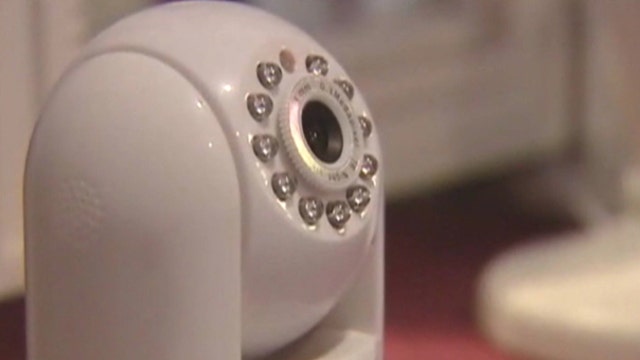Your Home Appliances May be Spying on You
Even if you are home alone, that doesn’t mean you aren’t being tracked or monitored.
A Texas couple got quite the scare this week when the baby monitor in their daughter’s room was allegedly hacked and a stranger called out their two-year-old’s name through the system as she slept. The monitor was hooked up to the family’s wireless system, a feature that is touted for many home technologies as a benefit, but security experts warn it can expose homeowners to potential risks.
The camera on the monitor reportedly allowed the hacker to see their daughters’ name spelled out on the wall, and seemingly the child as well.
Consumers need to weigh the convenience of smart items that are tied to WiFi connections with the potential of their personal data being exposed by using them, warns Jason Glassberg, co-founder of Casaba, a security analysis and consulting firm.
“People think about these things for their benefits, but never think of the unintended consequence of what happens when someone who is bad gets a hold of it,” he says.”The downsides may outweigh the benefits.”
Here’s a look at some of the security risks that may already be lurking in your home:
In the Garage
The ability to have your car start wirelessly from an app on your phone is a great convenience, says Alex McGeorge, senior security manager at security assessment firm Immunity, but it also means that if your phone is hacked--that person may be able to access this control.
“If I have access to the app that can unlock your car, then I can also turn your car lights on, waste your gas and lock and unlock your doors making it more difficult to access.”
He adds that if one app on your phone is hacked, everything is at risk. “This is another avenue of attack that people tend to forget,” he says. “If your [car app] is compromised, then hackers have access to the other apps and data you have.”
Automatic garage door openers can also be hacked, leading the way for robberies, according to Glassberg.
“There are devices that proof set codes and run through all of the code possibilities until it finds the one that opens your garage door,” he says.
In the Kitchen
Being able to see the weather or watch television on the front of your fridge while eating breakfast is a modern-techie’s dream, but Glassberg says users aren’t taking the proper precautions when using the technology.
“When all is said and done with these smart internet devices, you are still dealing with a computer,” he says. “They face the very same risks that happen when you are on a PC with viruses and people getting in and hacking. It’s a fridge that connects to the internet, but it’s a fridge with a computer built into it.”
Users should run updates on smart refrigerators regularly, he advises, just like a computer to make sure the latest virus protections are in place.
Apps that wirelessly start items in your kitchen or operate things like your washer and dryer or refrigerator remotely can also be abused to waste energy and power, says McGeorge. Thermostats that users can control wirelessly can allow unsavory hackers access to these devices within the home, says Glassberg. Bottom line: Password protect everything and be sure your systems in the home and on your phone are as current as possible.
In the Living Room
Owners of smart TVs have to be aware that hackers may be able to turn on the Webcam within the device to spy on users and their homes throughout the day, according to McGeorge. This paves the way for robberies and more, says Adam Levin, founder of IDT911. These televisions and even smart gaming consoles are all connected to the Wifi systems within your house, making any data on that system susceptible.
“If you have a bad password on your WEP or WPA [system] you are sunk,” warns McGeorge.
Always remember to password protect your smart television, Glassberg says, and again, treat it as a computer first and a TV second.
“These things have web cams for Skype and instant messaging and someone can conceivably put a Trojan program on this and turn your web cam on and just watch you,” he says. “You have to make sure this is updated and taken care of with security patches.”
McGeorge says hacking your TBV or gaming consoles can also do more benign things like give these people access to your Netflix account, for example, all further compromising your privacy and personal data, even if it is just your latest movie queue.
Online and Beyond
Gmail users got a reminder that their privacy is not exactly a given this week, with Consumer Watchdog reporting that the tech giant said users should not expect privacy when sending messages to Gmail.
Also, the Financial Times reported that new software is hijacking users’ visits to YouTube with an extra layer of advertisements that can install malware onto computers.
“On Gmail, you agree to their terms of service, but what is a bit scary is that they make the contention that you only need to have one side of the conversation agree to being monitored,” McGeorge says.
Experts say this is all the more reason for users to pay attention to the licensing agreements they mindlessly accept when using different programs like Gmail and YouTube.
Levin’s greater concern involves smart devices within the body—such as pacemakers or insulin pumps being hacked. Levin cites legendary White Hat Hacker Barnaby Jack’s ability to hack into medical devices—specifically insulin pumps—to show the security risks involving the technology.
“At one level or another, it’s all a cyber security issue,” he says. “This gives some the power to hack into these devices for harm. We have to keep in mind that privacy is under assault daily. Anytime there is an innovation, there is someone waiting to attack you.”




















